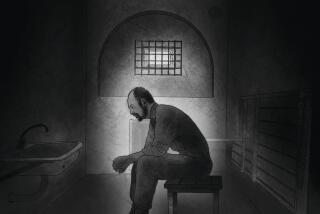TURKEY : New Law Won’t Stop Abuses of Human Rights, Critics Fear
One year after taking power, Prime Minister Suleyman Demirel is under fierce attack from domestic and international critics for failing to deliver promised improvements in Turkey’s lackluster human rights record. For too many Turks, “Midnight Express” images of barbaric prison conditions are still a reality, the critics say.
“A new Turkey--the walls of all police stations will be made of glass,” said Demirel as he took office for the third time following elections in October, 1991.
This week, the Turkish Parliament passed a law that would restrict the practice of holding prisoners for long periods without charge or access to counsel. “If someone is accused of something, it must be proved,” Demirel said. “Citizens are worried about what may happen to them until they are in the end proved innocent.”
Justice Minister Seyfi Oktay told Turkish reporters the law would help end trial delays that have sometimes left prisoners languishing in jail for five or six years before being acquitted.
Critics insist, however, that the new law was watered down to exclude crimes involving terrorism or national security, and they fear that it will have little real impact in a country with a long history of arbitrary authority. The pro-Kurdish newspaper Gundem recently lamented: “Our reporter was taken into custody last week for reporting that he had been taken into custody the week before.”
“There has been too much talk and too little action on the part of the Turkish authorities,” the human rights group Amnesty International said in a scathing report issued in London last week.
At home, where longstanding abuses around the country have been lately compounded by an ugly rash of death squad-type murders in the convulsed Turkish southeast, critics are equally outspoken.
“Despite promises of democratization and transparency, nothing positive has happened,” said Akin Birdal, the 44-year-old agronomist who is the new president of Turkey’s Human Rights Assn. “Torture is systematic. Fourteen people have died under torture in jail during the past year, and another six are missing.
“The new law cannot stop the torture or disappearance of people under arrest. It is just to look good to the outside world.”
As builders of a brawny, rapidly modernizing nation of nearly 60 million that is the world’s only Muslim democracy, most Turks seem more preoccupied with bread-and-butter issues like inflation and recession.
Still, Turkey’s friends are alarmed. Diplomats here wonder whether quiet U.S. diplomatic pressure on behalf of human rights will become public and embarrassing to Demirel with the arrival of the Clinton Administration.
Most complaints of torture and beatings are from the period of police investigation immediately after arrest, but hunger strikes at jails around the country this week protested prison conditions as well.
During an interview at his office here this week, Demirel said that the reform legislation will help repair Turkey’s international human rights image but that its intended effect is domestic.
“It is going to be a law that will not take away the authority of security forces fighting against terror,” the 69-year-old leader told The Times. “It will be applied for cases in which terror is not involved. We are not trying to persuade our friends in the West, but the Turkish people.”
In southeastern Turkey, where security forces fight guerrillas seeking an independent Kurdish state, human rights groups say 335 people have been murdered in the past two years--165 of them since Demirel took office.
The murders are described as “mystery crimes,” but Amnesty International cites “growing evidence to suggest that security forces collude in such killings and may actually instigate them.” On Friday, unidentified gunmen shot to death a Kurdish journalist in the southeastern capital of Diyarbakir. He was the 10th journalist to fall victim to a death squad-like murder.
Turkey has dismissed the Amnesty International report as biased and “full of unjustified allegations,” but Kurdish leaders say it is on the mark.
More to Read
Start your day right
Sign up for Essential California for news, features and recommendations from the L.A. Times and beyond in your inbox six days a week.
You may occasionally receive promotional content from the Los Angeles Times.






